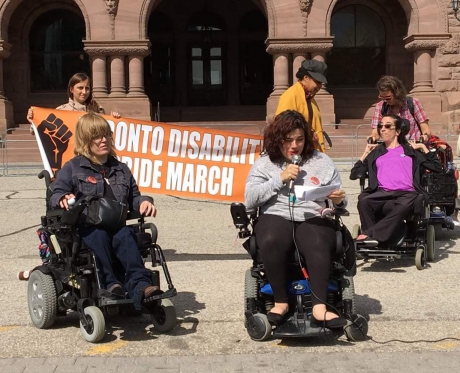Interviews
You are here
The history and politics of Disability pride: Interview with founder Melissa Graham

September 28, 2021
The eleventh edition of the Toronto Disability Pride March was held virtually on September 18. Socialist Worker interviewed Melissa Graham, march founder and organizer about how the march was started and why it has become a key annual event in Toronto and a milestone for disability activism.
SW: Why did you start the Toronto Disability Pride March (TDPM)?
Melissa: TDPM starting out of Occupy Toronto and the Occupy movement back in 2011. It was a little later into the Occupy movement when we started to see that disability issues were not being covered, although lots of things were happening around the disability movement at the time.
Rob Ford, who was the Toronto mayor, was looking at cuts to Wheeltrans, he tried to cut out the International Day for Persons with Disabilities—which he was not technically allowed to do.
Also, we were seeing a lot of police violence against disabled and mad folks. Sammy Yatim’s murder (by police on a streetcar), happened soon after this.
At that time, intersectionality wasn’t really a conversation in disability politics. A lot of what was happening in the disability movement was happening behind closed and was seen as this elitism, bourgeois thing that everyday disabled people couldn’t access.
It was a big deal for us to take disability issues to the street. Back when I first organized it, I wasn’t thinking that big, I just wanted disabled people to have a say in everything that was going on.
So, I printed off these tiny flyers on my computer printer and started handing them out. All I did was just hand out flyers and tell people by word of mouth that we were doing this thing. There was no social media, no website.
That was the times and that worked. 100 people showed at Nathan Phillips Square! That was in late October, which is later than we do it now. It was freezing! We duct taped signs to peoples’ chairs and walkers. There were a few speeches, and we took to the streets and chanted.
The feeling of marching with a bunch of disabled folks was really awesome. I don’t think it had happened before in Toronto, to my knowledge, it hadn’t. We’ve had other disability events, but not ones where people were on the streets marching.
And, then we just kept doing it and building on it and it’s become this entity. People come to expect it every year. People tell me that it means something, which is brilliant.
I think a really important piece that I’m really proud of is that we’ve stuck to prioritizing the voices of people who are most marginalized among us. We don’t have professional speakers or leaders speaking but people who don’t often get a chance to speak. I think that’s really critical for what we do.
SW: How do think that TDPM has impacted the political landscape?
The fact that the march started with the Occupy movement and the politics of Occupy that anyone could come and make a difference is so radically different than what we were seeing in mainstream disability movement.
TDPM has become something where even people who haven’t gone know about and know it is a thing. It has been written about in academic publications, just because it is an anomaly in terms of organizing. And, it is consistent and happens every year.
It has started a conversation about who gets to have access to the decisions made around disability issues and what are important issues to talk about, particularly in the last two years.
Last year we focused on Black Lives Matter, and this year we focused on Indigenous disabled folks, this is not something we are seeing in disability organizations yet. We are always looking for a way to start new conversations about things that are happening.
SW: How was the event this year?
Melissa: This year the event went really well. We have a team of nine people now to organize the march. I was really honoured this year that we got Wanda Whitebird, an Indigenous elder and activist, who is working on a project to make Indigenous traditions more accessible to disabled, Indigenous folks.
The organizers did not know Wanda, but I think it speaks to the credibility that we have created over time. We have been really careful to stay true to our values. We have seen other movements in the city that were started by radical grassroots movements that started compromising, taking government funds and things became more complex.
But, also it was the politics of that time, the 1980s and 90s, they were very different from the politics of the Occupy movement and Toronto Disability Pride March. Post 2011, we need to do the politics of THIS time and include intersectional and issues of oppression and the COVID pandemic has exacerbated the gap.
SW: What’s is the future?
Melissa: We are going to keep marching!
Section:










